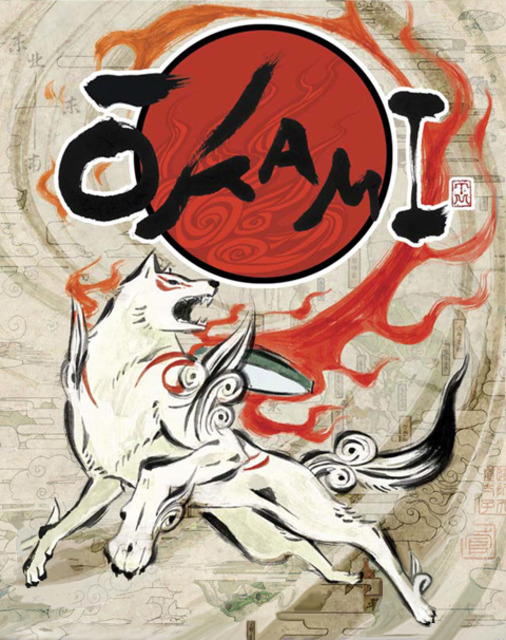An astonishing Adventure into Japanese Folklore
Okami could very well be the game that settles the debate whether or not video games should be considered art. It's hard to not be enthralled by its lush, flowing colours, breath-taking art design and highly stylized scenery and characters. It would be unfair to reduce the game to simply being "pretty" however, as the underlying gameplay, while very reminiscent of Nintendo's Legend of Zelda series, is just as superb and the distinctly Japanese setting sets it apart from anything else out there.
Incidentally, you play as Amaterasu, the Goddess of the Sun, re-incarnated in Nippon in the form of a white wolf by the tree spirit Sakuya to battle the evil demon Orochi. Amaterasu had already defeated the 8-headed snake and vanished thereafter, but it seems someone resurrected the legendary evil exactly 100 years after its demise, corrupting most of Nippon in the process. Joining in for the ride is Issun, a tiny, bug-sized man, claiming to be the greatest artist who ever lived. Since the celestial wolf is unable to talk, Issun is of course a welcomed guest on your journey to converse with the various villagers and travelers you'll meet on your path. The story is indeed quite entertaining, filled with surprising twists and lovable characters. It's also a surprisingly long adventure that can easily last you for 30-35 hours and even longer if you're inclined to do many of the game's sidequests netting in unlockable content like artworks, music tracks and powerful items for a new game+ retry.
As mentioned, the gameplay borrows many elements from Link's adventures in Hyrule, but the experience is more streamlined and you'll rarely feel a distinct separation between a dungeon environment and an "overworld". Instead you'll be constantly cleansing the nature of an evil darkness that has befallen the land, uncovering new areas in the process, helping the people of Nippon with their problems, eventually uncovering who is behind all the mayhem going on. Naturally, Amaterasu, or Ammy as Issun likes to call our doggy heroine, will encounter many evil underlings trying to stop her and while there is a big variety of demons, often requiring specific strategies, combat is for the most part overly easy and can soon become more of an annoyance than anything else. Luckily, you can try to avoid most battles by keeping your distance to the hovering scrolls, representing mobs of monsters, trapping you in a small arena over the course of the fight, however the rewards from besting foes can give you access to a number of very handy items later on.
Aside from conventional weapons, of which you can equip a main and a sub weapon for a number of different playing styles, Amaterasu is also capable of drawing miracles into the world using the celestial brush. Holding R1 projects the world onto a canvas on which you can draw various patterns for different effects, a technique working surprisingly well and becoming very intuitive after only a few tries. The process is context-sensitive as well, drawing a circle onto the night time sky for example, will bring forth the sun, while the same symbol drawn onto a water surface will create a lily pad for Ammy to savely cross rivers and seas. These techniques figure into many of the game's puzzles and are often required to proceed to new areas. They also figure prominently into the game's boss battles which often need you to follow specific tactical use of newly learned brush moves in order to defeat them. All in all, you'll find 13 different techniques throughout the course of the game, some of which can even be extended by doing optional questing.
The technical aspects of the game are undoubtedly overshadowed by its art design as both the visuals and audio are mesmerizingly beautiful in their composition. The soundtrack consists of numerous pieces, covering every layer of the game, from dark, mysterious tunes of unsettling dungeons to pompous ballads when roaming over the plains of Nippon and fitting themes for every major character. Disappointing however is the complete lack of voice acting throughout the game. Instead, you'll have to click through dialogues underlaid with squeaky pseudo voice acting, somewhat similar to the technique used for the King of All Cosmos in Katamari Damacy. At least the "voices" were chosen carefully and each character has a distinct voice. The graphics can be criticized along those same lines as objects of importance like treasure chests will often fade in when you almost ran past them and the camera, while offering two zoom distances, can be rather troublesome, especially indoors, making some brush puzzles trickier than they needed to be as you have to figure out how to get the desired perspective onto the canvas.
All told though, Okami is a fantastic game, incorporating many of the genre's best aspects in near perfection, offering a unique setting and compelling story wrapped in an outstanding presentation.
